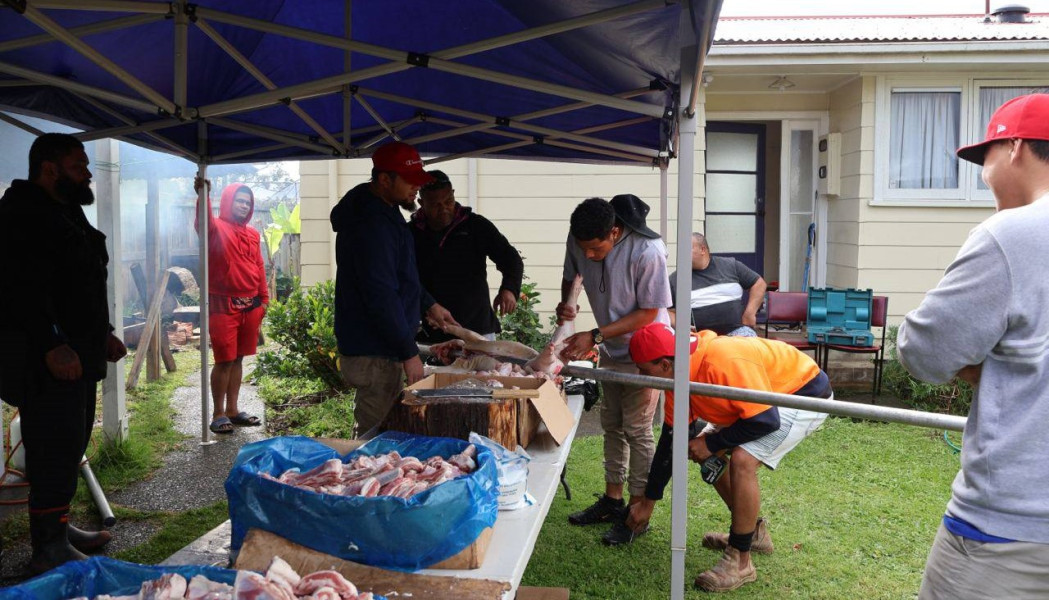Food, music, and storytelling promote language
Food, music, and storytelling promote language

(Picture caption: The Ako Kuki project taught Tongan youth how to cook and umu and traditional dishes, while also promoting lea faka-Tonga.)
Food, music, and storytelling are three pillars integral to Tongan culture, which have been showcased to promote lea faka-Tonga in Aotearoa.
The Pacific Languages Community Fund (round one), established to support Pacific communities to drive and lead solutions to retain and revitalise Pacific languages in Aotearoa, helped the Tongan Ethnic Youth Movement under the Assemblies of God New Zealand launch three projects based on the pillars.
Youth Director for the Movement Pesi Sikalu says the focus of these projects was to teach young people the Tongan language through hands-on activities.
“With the food project (Ako Kuki, which means learning how to cook), we invited our parents to come and teach our young people how to cook traditional Tongan dishes,” Pesi explains.
“Our boys learned how to prepare a traditional Tongan ‘umu, while the girls cooked side dishes, such as crab salad (salati paka), raw fish salad (‘ota ika), and lū sipi (a traditional Pacific Island dish comprising lamb or a meat of your choice, taro leaves, and coconut oil).”
The focus then turned to music and the Pō Hiva singing competition was contested between the five districts which make up the Tongan Ethnic Movement.
This event was open to everyone and all songs had to be in Tongan, Pesi adds.
“Judges marked each performance based on the pronunciation of Tongan words, stage presence, arrangement of the songs, and overall sound, among others.
“With our storytelling project, we started a podcast titled FANANGA, which refers to myths and legends, but for the project, it was for sharing the real-life stories and experiences of our older generation.
“We wanted to preserve the idea of parents and grandparents gathering their children and grandchildren at their feet, and passing down their wisdom, their counsel, and their advice.”
Pesi says in the fast-paced western world, young people have lost the beauty of sitting at the feet of their parents and grandparents and listening to them.
“So, this podcast is our way of laying down the mat (folahi e fala) and inviting our young people to come, sit and listen to the stories of our older generation, who carry such wisdom and insight necessary for today.”
Pesi says the projects were a hit among the Movement’s youth, and organisers potentially want to schedule the projects annually.
“The projects have also triggered some meaningful thoughts on culture and identity, so we want to tap into this through conversations, or talanoa evenings, too.”
Born to Tongan parents, who are both pastors, and raised in the Tongan Pentecostal Church, Pesi took on the Youth Director role with the Movement last year, while also working at Alphacrucis College and pursuing further studies with Laidlaw College.
She says the value of Pacific languages should not be underestimated.
“We are a diaspora community here in New Zealand, distanced from our native land by the seas.
“Our Pacific languages, our mother tongue lies at the very core of our cultural identity and it keeps us connected and grounded to our culture, despite the physical distance.
“By grounding our young people in their cultural identity and cultural roots, they will have the confidence to walk in their purpose, to dream big, to exceed expectations, and to live boldly.
“My hope is by knowing who they are and where they come from, they will live fiercely and unapologetically.”
Visit the MPP website for more information on the Pacific Languages Community Fund and current funding opportunities.
